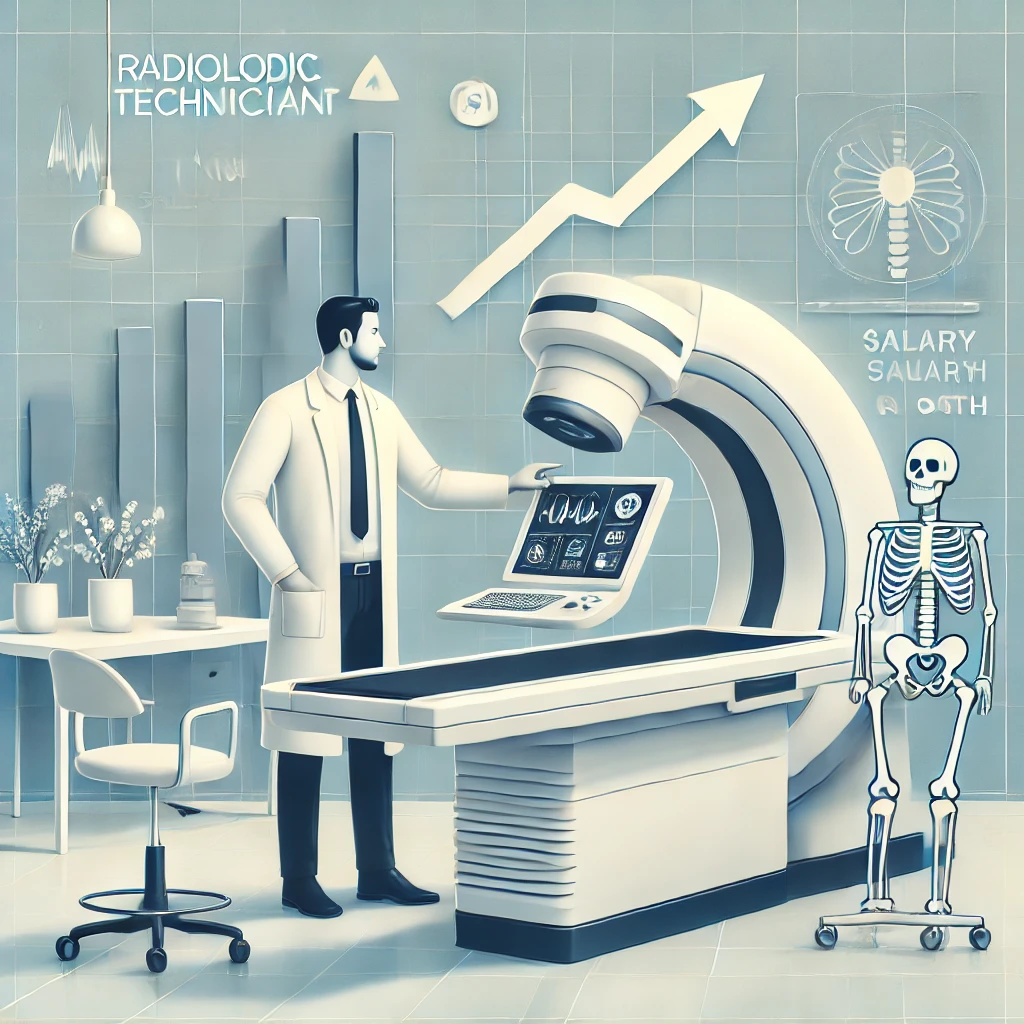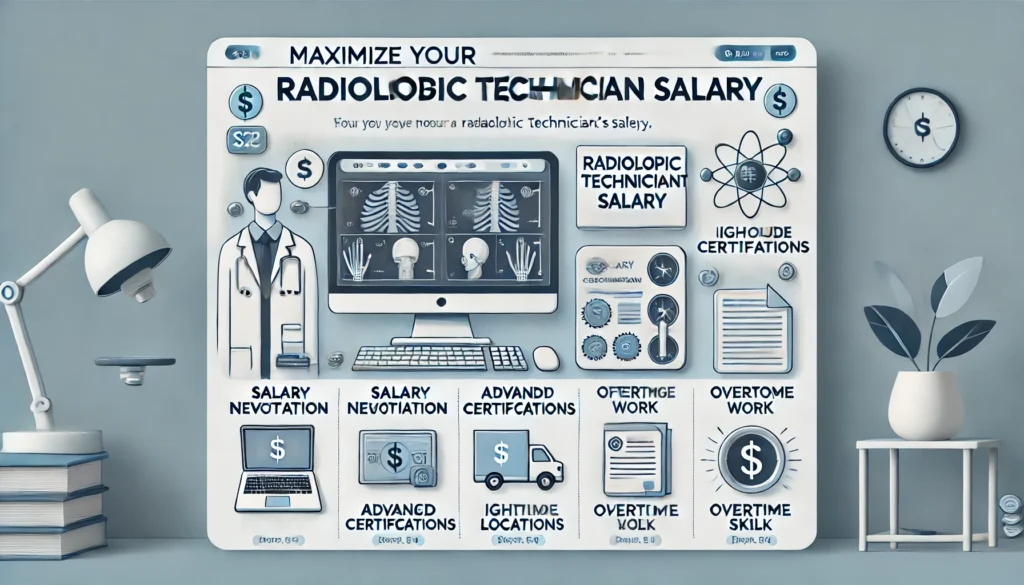Are you a Radiologic Technician looking to raise your salary but unsure where to start? As a Radiologic Technician, you play a critical role in the healthcare system, providing essential diagnostic imaging services that aid patient care. Yet, many Rad Techs find it challenging to advance their careers financially. With the increasing demand for diagnostic imaging, now is the perfect time to leverage your skills and secure a higher salary. This article will guide you through practical strategies for increasing your Radiologic Technician salary, from negotiation tactics to identifying the most lucrative opportunities in the field.

Understanding the Current Radiologic Technician Salary Landscape
Before diving into strategies, it’s important to understand the factors that influence your salary as a Radiologic Technician. According to the U.S. Bureau of Labor Statistics, the median annual wage for Radiologic Technicians is approximately $63,710. However, this figure can vary significantly based on location, years of experience, and the type of facility where you work. With this in mind, let’s explore how you can maximize your earning potential.
1. Negotiating Your Radiologic Technician Salary
Salary negotiation is one of the most effective ways to increase your earnings, yet it’s often overlooked. Here are some tips to successfully negotiate a higher salary:
- Do Your Research: Before entering negotiations, research salary benchmarks for Radiologic Technicians in your area. Websites like the U.S. Bureau of Labor Statistics, Glassdoor, or Payscale can provide valuable insights. This will give you a realistic expectation of what you can ask for based on your experience, location, and specialization.
- Highlight Your Skills and Achievements: Employers are more likely to offer a higher salary if you demonstrate how your unique skills contribute to the facility’s success. Highlight certifications, additional training, or key accomplishments that make you stand out.
- Timing Is Key: The best time to negotiate is often during annual performance reviews or when you’ve just completed a significant achievement, such as earning a new certification or successfully managing a high-stakes project.
- Practice Your Pitch: Prepare your argument and practice discussing your salary expectations confidently. Explain how your role impacts patient care and facility operations, which can justify a higher wage.
Looking to increase your earning potential in healthcare? Discover comprehensive salary negotiation strategies tailored to healthcare professionals.

2. Pursuing Advanced Certifications
Adding specialized certifications to your resume can significantly boost your earning potential. Advanced certifications demonstrate a higher level of expertise, making you more valuable to employers. Consider pursuing certifications such as:
- Computed Tomography (CT): Technicians certified in CT can earn up to 15% more than their peers without the certification.
- Magnetic Resonance Imaging (MRI): MRI Technicians often command higher salaries due to the specialized nature of their work and the equipment they use.
- Cardiovascular-Interventional Technology (CIT): Specializing in this area can open doors to higher-paying positions in hospitals and cardiovascular clinics.
These certifications increase your value and open the door to more advanced and specialized roles that often come with higher pay.
3. Choosing the Right Work Environment
The setting in which you work plays a large role in determining your salary. Radiologic Technicians working in hospitals or specialty clinics often earn more than those in outpatient care centers or smaller facilities. Here’s a breakdown of salary variations across different environments:
- Hospitals: Hospitals generally offer the highest salaries due to the fast-paced, demanding nature of the work. Rad Techs here may have the opportunity to work overtime or take on additional responsibilities, which can lead to higher earnings.
- Diagnostic Imaging Centers: These facilities are often highly specialized, which can lead to higher wages, particularly if you have advanced certifications.
- Outpatient Care Centers: While these settings may offer lower base salaries, they can provide more predictable schedules, which could appeal to those seeking work-life balance.

4. Relocating to High-Paying Areas
Geographic location is a major factor in salary potential. Radiologic Technicians in metropolitan areas or states with higher living costs tend to earn more. For example:
- California: Rad Techs in California earn some of the highest salaries in the nation, with an average annual wage of $86,120.
- Massachusetts: This state also offers competitive pay, with technicians earning around $79,000 annually.
- Texas and New York: Both states offer high salaries, often exceeding the national average, particularly in urban areas.
Exploring job opportunities in these high-paying regions could lead to a significant salary increase if you’re open to relocating.
Professionals can explore healthcare salary variations across the U.S. and consider locum tenens roles for flexible, high-earning opportunities to maximize income potential.
5. Gaining Experience and Building a Network
Finally, experience is one of the most straightforward ways to increase your salary. As you gain more years of experience, you’ll naturally become more valuable in the job market. Here are a few ways to capitalize on your experience:
- Seek Leadership Roles: If possible, aim for supervisory or leadership positions within your department. These roles often come with higher salaries and additional benefits.
- Build a Professional Network: Networking can be invaluable in finding higher-paying job opportunities. Attend industry conferences, join professional associations such as the American Society of Radiologic Technologists (ASRT), and connect with colleagues who may have insights on better-paying roles.
Networking can be transformative for career growth. Discover tips on building a strong healthcare network that supports your professional advancement.

Conclusion: Maximizing Your Radiologic Technician Salary Raise
A salary raise as a Radiologic Technician is well within reach when you take a proactive approach. By negotiating effectively, pursuing advanced certifications, choosing high-paying work environments, and networking within the industry, you can enhance your earning potential significantly. Remember, even small steps toward specialization and skill-building can yield substantial financial rewards. Take charge of your career growth, leverage your expertise, and explore every opportunity to maximize your Radiologic Technician salary.
FAQs on Increasing Radiologic Technician Salary
1. Can I ask for a raise as a new Radiologic Technician?
Yes, you can negotiate your salary as a new Rad Tech. Research the average starting salary in your area and use that as a benchmark. Remember to highlight any relevant experience, internships, or certifications that set you apart.
2. What certifications should I prioritize to increase my salary?
MRI, CT, and Cardiovascular-Interventional Technology certifications are among the most lucrative. These specialties require additional training but are in high demand, often resulting in higher pay.
3. How often should I ask for a raise?
A good rule of thumb is to request a raise during annual performance reviews or when you’ve made a significant contribution to your department, such as completing a challenging project or earning a new certification.
4. Are there any non-clinical roles that offer higher pay for Radiologic Technicians?
Yes, positions in healthcare management, education, or sales (particularly medical imaging equipment) can offer higher salaries for Radiologic Technicians with extensive experience.
5. Does the facility type impact my salary as a Radiologic Technician?
Yes, technicians working in hospitals or specialized diagnostic centers tend to earn more than those in outpatient care facilities. Facilities with higher patient volumes or more complex cases usually offer better pay.







